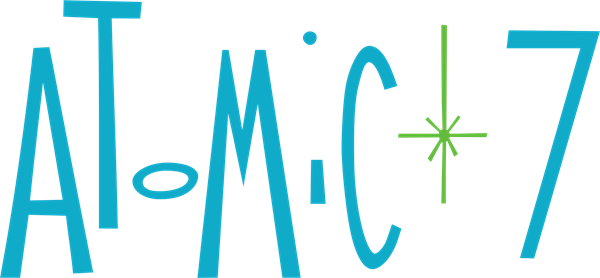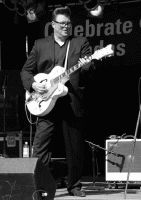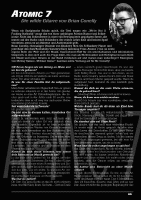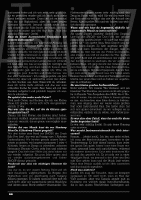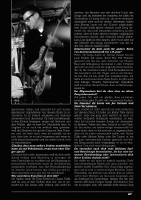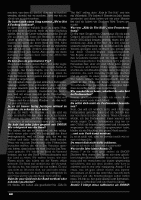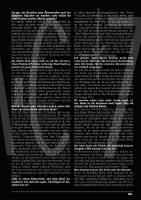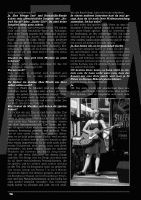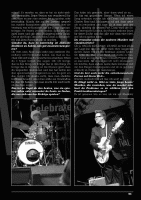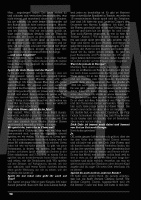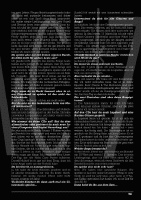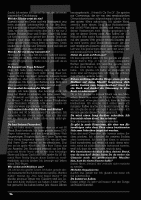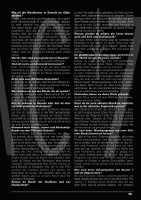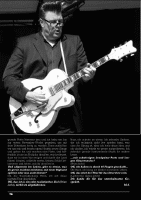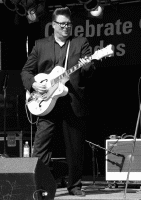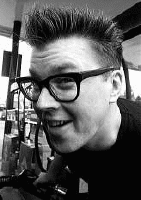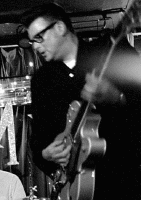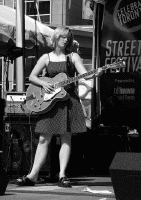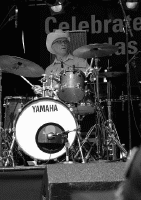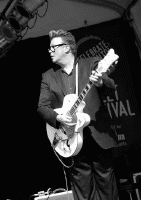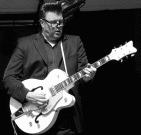The Wild Guitar Of Brian Connelly
If a surf guitar piece plays with a song title like "We're Not A Fucking Surf Band," you can see the humor and irony. Not the worst things in a scene shaped by retro purists, who always are on the lookout for violaters of the pure teachings of style loyalty and authenticity and don't understand fun.
Brian Connelly, former guitarist of Shadowy Men On A Shadowy Planet and now head of the Surf / Rockabilly / Country / Easy Listening trio Atomic 7 has his own view of the world and the music. Sufficient material for an unstoppable and informative discussion, in which he also clarifies how as a non-musician and a non-guitarist he makes his money with music and a guitar, and why he possesses at least five copies of Mickey Baker's The Wildest Guitar. Let's bring on Mr. Connelly!
When and where were you born?
I was born in Edmonton, Alberta on July 20th in 1958. It's a really sort of ugly cold city, but I love it.
Which kind of family background do you have?
My dad worked in the oil business. He actually worked in the arctic. I think they were some sort of exploratory group that went and dug holes looking for oil in the arctic, which meant he was gone a lot and left my mum to bring us up.
When did you move to Toronto?
I think it was 1979.
So you grew up in this small ugly town, as you said.
(laughs) Yes, they'll be so proud of me. You know that I thought their great town was quite small and ugly. Actually it's not a bad place. Especially in the west of Canada they don't really take care of their architecture all that well. They tend to tear things down rather than take care of the buildings. They'd rather flatten a city block than take it and spruce it up and keep some of that character. That's my big problem with the west of Canada.
Can you remember the first thing that made you become interested in music?
Yes, I definitely do. I think I got everything from my sister. She was about seven or eight years older than me and she had a record player and 45s that I was not allowed to touch, so of course that was all I wanted to do. It was kind of the forbidden fruit. I had to get at her record player. That's kind of how I got attracted to music.
What did she listen to?
Oh God. I think the first thing I really remember was Bill Haley stuff. She - thank God - had pretty good taste. It was like all the teenage Rock 'n' Roll stuff, but she also knew Bobby Bland. That was back in the days, when the radio stations actually played country stuff along with Rock'n roll things along with Dean Martin and Frank Sinatra, so if you paid attention, you got a pretty good education.
Can you remember the first record you bought?
I don't. I can't really remember.
Hmm, we can't do anything about it.
(Laughs) I could make something up, but that would just be wrong.
Which bands did you listen to as a child/teenager?
I think my favourites were probably T. Rex, Slade, Mississippi Fred Mc Dowell and I think Ziggy Stardust got a lot of play around our place.
So you were into Glam Rock?
I think that was also kind of forbidden fruit. It wasn't represented on the radio, I think it was from reading magazines. There was that thing out there that nobody had heard, so we actually hunted some of the stuff down. I think I've always been attracted to music you have to work to hear.
When did you start playing yourself?
Late high school. I think when I was eleven, my parents said for my birthday: You get to take music lessons and your choices are accordion, guitar or oboe. I didn't want to do any of them, but the guitar seemed least terrific.
So you had lessons at a music school?
There was a six month course. It was sort of an aptitude test to see, if you had any aptitude for your instrument. The six month course I took lasted two years, so I clearly had no aptitude for the instrument at all and I was really, really happy, when it finally got stolen and I didn't have to do deal with it anymore. Then I let it go till high school, because it wasn't formal lessons. Somebody knew a song and he taught you how to play it and you're sort of learning the music you wanted to listen to rather than the Mel Bay book of "How to hold the plectrum" (laughs).
Do you have any harmonical knowledge of the instrument today?
(laughs) Not a bit. I have no clue. I still can't read music, it takes me 45 minutes to find a C on three strings. I tried. I got reinterested in guitar music about two years ago, so I actually decided I was gonna go and take lessons again, so I found an amazing teacher, who I just loved, I loved everything he did, I stocked him for three months and then I found out that he taught so I thought: Wow, I take some lessons and see what this is all about. I'm still clueless. I took lessons for about a year, but I spent so much time working on the lessons that I wasn't doing any writing and that was a bad thing for me. So I bailed on the lessons and all of a sudden the writing stuff came back.
So you play more by ear?
Completely by ear and stuff I steal off records. I guess not much has changed since I was 17.
So that was the way you learned to play guitar?
Absolutely. I just found records that had stuff on that I find was really appealing and I just figured out how to get close.
Which kind of music did you play before SMOSP?
The three of us was in a band before SMOSP, which was called Crash Kills Five, that was essentially just a three-chord punk rock band. That was just us learning to play instruments, we knew three or four chords between us, started writing songs, the odd Hermann's Hermits cover done really loud and poorly. That lasted a little while and then it all broke up. A couple of years later we got back together and turned it into SMOSP.
So punk rock was an important element for you.
It was, it was sort of our saving grace, because Reid and I grew up together. We both moved to Calgary, Alberta at the same time and that was the beginning of high school. He didn't know anybody there and neither did I, but we were both big music fans and lived a block away from each other, so the record collections were pretty important and the stuff on the radio was just so wild. The first time we heard the Ramones, it was the third coming. Everything made sense and we were really, really attracted to it.
When and how did you get interested in instrumental music?
When our singer quit! (laughs). The originals line-up of SMOSP was Don Pyle just learned how to play drums, he was just learning, he almost had a whole kit and I was playing bass and Reid was playing guitar and we had a singer. I think that lasted about three weeks until the singer decided that it was really too far to come to practice, so he quit and left us sort of standing there: Well, what are we gonna do now? So Reid and I decided to flip back to the instruments that we knew best, so I got back to guitar and he got back to bass and we just had an idea that we wanted to write soundtrack music. With the equipment that we had that's kind of the sound that came out. We had a little Fender amp with reverb and tremolo and Don only knew how to play one beat and that's how it all started, we started writing from that.
You weren't big surf music fans?
Not really. We were aware of the Ventures and a little bit of the Shadows, because they weren't that popular in Canada. So from getting copies of the NME that were six months out of date by the time they got to Alberta we managed to get a little idea of what was going on, but we weren't massive surf fans or instrumental fans. It was later that we developed the love for it, when we started researching it, just to see what did happen before.
So it happened more by accident that you got into this thing?
It was very accidental (laughs). There was no planning or whatsoever.
What makes instrumental music interesting for you?
Hmm…(thinks). I'm not sure. I love its limitations, especially in the three-piece format. It's down to everybody plays all the time, nobody can take a break, nobody can lay back, but the other guys take over. It's really involved music and I really enjoy that. It's not like having a 4piece band, where somebody can go to the bathroom in the middle of the set and the music can keep on going. If one person falls down, everybody falls down and I kinda like that.
Anything else?
(Laughs). I like the fact that it's been completely forgotten. I'm not sure about the rest of the world, but as far as Canada is concerned there used to be hundreds of really good instrumental bands that recorded in the late fifties/early sixties and nobody has really bothered to archive any of that stuff. It's all but forgotten and nobody really cares about instrumental music at all, whereas in the States, just because of the Ventures and the Wailers, they got a little bit of a history about it. It's never really gone away in England, because of the Shadows being the biggest thing on the planet. I don't know how it is where you are, but it's all but forgotten here and if somebody doesn't baby-sit it and keep it alive, it's gonna be gone.
Do you think you can express different things than with vocal music, when you play without a singer?
You have to try harder, because you're relying more on setting up a mood rather than somebody telling a story and depicting the mood, you have to set it up musically, which is a bit of a challenge and some people can do it really well and some of us are trying just as hard as we can.
Who are your favourites in this style of music?
I think my all time favourite is gotta be Duane Eddy, just because there was something about the things he did. They were really simple and memorable, the melody was the strongest point of the song and you could hum it, it stayed with you. It didn't sound like it was technically impossible and I think that's how a lot of people started picking up the guitar, because Duane Eddy was doing this really cool stuff, that didn't appear to be all that different, but he had this massive unbelievably fantastic sound that nobody else has been able to get. The playing is rather simple, but it all focused on the melody of the song and that's the part I really love.
Are you interested in other kinds of instrumental music, too like jazz?
Hmmm, I'm starting. Barney Kessel did a bunch of records with his band called the Poll Winners and that was stripped, just guitar, bass and drums and they did about four or five records that are the most unbelievable things you could imagine. And Barney Kessel is sort of the exception to the rule, because he's got a vocabulary I can't even imagine. I love that and I kind of steal bits and pieces of that. There was a lot of country instrumentals. It all comes down to being mood music.
But in general you're more interested in old stuff?
Definitely, because I don't think there is any new stuff. There's very little new stuff.
You could listen to Joe Satriani or Steve Vai, guys like that.
No, I don't, because I'm not sure of that stuff. I only heard small, small little bits, but it didn't really sit with me. It seemed very bloody technically amazing, but I need better songs to keep me interested. A lot of that stuff is so much flash. I'm sure they had some wonderful things, but it never spoke to me in a way to me that I had to go and investigate it, like Duane Eddy or Mickey Baker or Ike Turner, he did a bunch of instrumental stuff and that stuff just makes me insane, it's so wonderful. It's sort of my leaning.
You try to stay away from the usual surf/retro imagery. Is this a conscious decision or are you just not interested in this kind of stuff?
I didn't want to make it that easy. A lot of instrumental bands naturally gravitate to the whole surfer dudes and hot rod guys and it sort of comes down to a really bad cliché, so we definitely tried to stay away from that and the minute people started calling us a surf band was when we went out and learned 400 Alice Cooper songs instrumentally. Just to shake off: No, we're not falling into that thing that you think we're gonna do, although we are, but we're gonna pretend we're not.
You also had a song title "We're Not A Fucking Surf Band."
Yes, but it's also really fun to say, no, of course we're not a surf band, when you're doing a surf song, just because it drives people crazy. It's like saying you hate the Beatles, it drives people crazy, how can you hate the Beatles, they were the best band that lived. Anything you can do to cause a stir and get people thinking is probably a very good thing. So we do a surf song and follow it up with "We're Not A Fucking Surf Band."
So you're a kind of provocative guy.
Well, that was kind of what the band was based on, because everybody said that we couldn't do it. The funniest thing of all time, the most punk rock thing you can do is start an instrumental band, when you can't play your instruments, which is exactly how we started. So we wrote all these really simple instrumental song, just bloody awful, but we were having a really good time doing it and it drove a lot of people crazy, especially the jazz guys, because we were getting some pretty big gigs and we were pretty much just clods and baboons and real musicians… oh, they wanted to kill us!
Yeah, it's always fun to get jazz people angry, they take it to seriously.
Yeah, well, you know how musicians are, they are a very serious lot. Anything you can do to light a little fire under their butt is probably a healthy thing.
You played with SMOSP for almost ten years. How successful was the band?
We never looked at it as whether it was successful or not. We kept the band going, because there were things we wanted to do and that's how we used the band. If we wanted to visit some restaurants or record stores that we've seen in San Francisco, we'd book a tour all the way down to San Francisco. We just used the band as an excuse to get out of town and see the country. We wanted to learn how to make records, so we did the records ourselves. We just used the band as an excuse to do whatever we wanted to do. So there was no: Oh my god, we're not successful, what do we have to do to get successful. That wasn't important to us at all.
Did you make a living with the band or did you work beside it?
I think we all worked right up until "The Kids In The Hall" started, but Kids In The Hall was like a full time job anyway. We worked eight months a year on that and then we had a couple of months off, where we would do Shadowy Men tours.
What was Kids In The Hall, a TV show?
It was a group of comedians. When I moved to Calgary and met Reid, I also met Bruce McCulloch, one of the comedians in Kids In The Hall. The three of us grew up together and when Reid and I moved to Toronto, Bruce followed and set up this comedy troop. From the beginning of this comedy troop, they always used our music for their live shows and we ended up working together for ten years. The show lasted for about five years on television here, but we did theatre and small club shows for years before that. Then they got picked up by Broadway video, who does Saturday Night Live and it turned into a pretty big deal. We just continued doing what we did, when we were still working the clubs with them. We wrote all their music and made sure that they didn't have anything that sounded too good.
How do you do it today, do you work or are you a professional musician?
Hmmm, luckily I'm still paying my bills with music.
You don't want to call yourself a professional musician.
No, I really don't, because I've met a couple of professional musicians and I'm definitely not one of those.(Both laugh) If I said I was a professional musician, somebody would come up and say: OK, smart guy, show me a C minor on your instrument and I'd have to sort of runaway. So until I get that stuff mastered, I'm still a music fan who likes to play music
… and makes money doing it.
Yeah, it's small, but it keeps me away from having a real job.
You don't have to be ashamed of it.
I'm not, I count myself as blessed.
What is the idea behind Atomic 7?
Atomic 7 to me is very different from Shadowy Men. Shadowy Men was three guys with an equal voice. It was an odd dynamic and we were always trying to show each other up, which made us sort of work really hard and it was very unique. Atomic 7 is pretty much something I've been doing by myself, which is kind of odd. It's the first time I've had to sit down and make all these decisions by myself. It's me learning how to write instrumental songs and how to run a band essentially by myself.
Atomic 7 sounds a little more sophisticated than SMOSP. Is this a result of getting older and becoming a better player or do you want to play different music now?
I think if you're lucky, you just naturally evolve. It's not really a conscious thing, the writing still feels the same as when I was writing for Shadowy Men, it's just that I've learned eight more tricks over the years and I also figured out how recording studios work and I'm a little closer on being able to predict how these things will come out at the very end, with the writing and recording and pressing and the artwork and all that stuff. I'm learning, but I've learned a lot in the last ten years how to make the stuff work.
But you don't feel too old for a little punk rock, because your old band always had a few elements of that?
(laughs) Well, there's something to be said about what comes with age. I just remember seeing, oh God, I think it was about five years ago, you get wrapped up in your own little circles and the bands around Toronto, it's always the same, it's always really young kids and then Nick Lowe comes to town and he's got Bill Kirchen playing guitar and it's just a bunch of grey haired guys and they just rocked harder than any 40 bands that I've seen in my life and I thought: Well, that's elegant and fine and I think I'd like to try and be part of that.
Which bands/musicians have an influence on the band and your playing?
Well, I will steal from anybody. Actually, in Canada there's a really healthy music scene now, where there wasn't before. It's pretty commercial here and what ever is big on the radio, you get 50 boy groups and stuff like that, but there's a couple of bands around. One of them is from London, Ontario, which is about two hours from here, called the Risdales. It's mostly country stuff, but the writing is so fantastic. We've been doing some shows together and they're nothing but an inspiration. There's another band from Ottawa called The Fiftymen, who sort of do roadhouse dance music, but it's loud and sloppy and wonderful. And again, it comes down to the writing, these guys can paint a really, really dark picture, that you don't understand until you listen to the lyrics. They both wrap their stuff up in beautiful little happy packages, but the lyrics are just delicious and dark. Those are my two obsessions right now, the Risdales and The Fiftymen.
Is there a guitarist that influences your playing, where you say I try to play a little bit like him?
Yes. My absolute all-time favourite guitar player - oh God, I'm gonna kick my ass for saying this - is Mickey Baker. He was a session guitarist in New York and he played with everybody under the sun. Screaming Jay Hawkins, Joe Clay and he was part of Mickey and Sylvia. He did an instrumental album in 1959 called The Wildest Guitar and from the very first time I heard this thing, if I could steal everything on it, I would be a happy, happy man. His playing is kind of a cross between jazz and blues, it's really sophisticated, but tons of reverb and tons of delay. It's the one record that I own, where I think it's absolutely perfect.
I think not too many people know the record. I have it in my collection, but I think it's totally forgotten by most guitar players.
Oh and it's a shame! I have five copies of it and I swear, I'm gonna need it. When I'm 65, I'm gonna be as excited about that as I am right now and was 20 years ago, when I first heard it. So you know the sound of that record and that's exactly what I've been trying to steal (laughs). Ever since I started the instrumental stuff, Mickey Baker, The Wildest Guitar, that's the holy ground!
Not too many people will come up after a show to you and will say: Hey, you sound like Mickey Baker.
Well, I don't. You know, you can match everything on that record, note for note, instrument for instrument and nobody's gonna sound like that, it's impossible. But, through trying to figure out how that was recorded and how that was made, you can stumble on three or four different tricks, that you can call your own. It's pointless emulating somebody that closely, but if you try and find a little something that's your own, I think that's what everybody is looking for rather than: Oh, he does a pretty good Mickey Baker. Who cares?
You have a fable for quite bizarre song titles. How do you come up with them?
Probably from my bizarre little life, I suppose (laughs). They don't seem all that bizarre to me, that's just the sort of things that I see that I want to write about. I don't obituary slap a title on to a song, it's a one will inspire the other sort of thing.
What comes first, the title or the music?
It's a 50/50 split, but it's mostly the title first and then it's all downhill after that. But the titles, sometimes they help, sometimes there is a smokescreen, just a sort of confused issues. Again, you never want to make it to easy.
Yeah, a lot of surf bands or rockabilly bands have very obvious song titles like "Hot Rod Racer" or "Surfer Girl", so your song titles are very different from that.
Well, it's also kind of a conscious thing, too. We don't have much of a rockabilly following, but those guys gotta open up and learn some more stuff, so I thought if I call my record … Gowns By Edith Head that means some little rockabilly guy gotta be going to a record stores, saying (with a deep voice): Excuse me, do you have a copy of … Gowns By Edith Head and he might learn a little something (laughs).
Do you think a lot of musicians take themselves too seriously?
I think every single one of them does. I don't like musicians at all.
Why not?
Well, because there so serious. Serious and self-centered. That's a dangerous little combination.
So you think they think about music just for the sake of it?
Well, yeah. You know, musicians are an odd lot (laughs). They're very hard to entertain, they're classically lousy tippers and there's gotta to be more to life than having a cool guitar and stuff like that. Read a book, play a bur lives record.
How do you find musicians to play with?
I trick them. That's kind of a hard thing. This is essentially my thing. It's like inviting people into your little world and not many people around here, musicians included, know much about instrumental music. So the guys I've played with have usually seen me in other incarnations and thought: Wow, that's a pretty cool thing, but they get into it and it's not everybody's cup of tea, because it is limited in what you can actually do, there's very little improvising. It's not to everybody's taste, but enough people have come through. I used to really fear other musicians coming in and learning this stuff, because they all do something strange to these songs. The songs are the songs and then you get these different personalities playing them and they all turn out different and that's the part of it that I've come to really, really enjoy. The latest line up of Atomic 7 is only four months old and we've only played three times, but it's brand new bass and brand new drums and their take on the stuff has changed everything again completely, which makes me work that much harder and now that I actually know what the band sounds like, I can write to that.
In another interview you mentioned that you choose them after their record collection. Is this true?
Yes, because anybody can play this. If you've been playing your instrument for six months, you can pretty much play this music. But to understand where it's coming from is the hard part. I tried playing with a couple of people, who come from really solid jazz backgrounds and they knew too much, they couldn't play it.
I know, it's terrible… (laughs)
It's a strange thing. The more I learn about music and musicians, the more fascinating that stuff gets. People, who have this massive vocabulary to quote Coltrane back and forth, can't play a Go-Go beat and stuff like that, which I find hilarious and wonderful at the same time.
Very often this people think, it can't be done so easy. I can't be true that the bass player only played one note, because you could play twenty notes to this chord.
Do you have both of the Atomic 7 records?
Yeah.
OK. The first one was done with acoustic bass by Clinton. Clinton could play anything on earth, but he also bored real easily. He liked it, but didn't really understand it. His take on that was wonderful in itself, but it was a different style of playing, very busy. Mandi, who played on the second one didn't like playing bass all that much, but she really understood what it took to get these songs across and her approach is completely different. Play less, play louder and give the drums some room. This is the stuff I love, watching people and their approach to playing music.
Do you think it's necessary to have similar influences to play well together?
Oh God, no. But I think you should have a distant end result as to how you want to do this and what you're trying to accomplish. If you had three guys, who were just sort of saying: OK, I gonna bring this to the song, I bring this to the song, I bring this to the song, chances are you're nor really gonna get anywhere and it has nothing to do with playing ability. It's all feel. I don't think you need similar influences at all, but you should have an understanding of the style that you're going for. I don't know, if that makes any sense at all…
It does. Do you tell people what to play or do you try to find people, who play the right thing from themselves?
I used to, but then it turns to… I'm a horrible bass player. When I write a song, Ill demo it and put the guitar, bass and drums down and then I'll give to somebody and say: Here's kinda how the song goes, do your own parts. That's when things get interesting for me, people's take on it and that will give me an idea of how to play this.
So you try to involve the other musicians?
Oh yeah, because I know me, I know what I'm capable of and I find myself rather boring (laughs), so I want other people's influence on this. I love the idea of a band, I would hate it, if it just was The Brian Connelly Project or something like that. I'm not interested in that. I want other people to come in and mess with things, whether it's good or bad, we'll figure it out.
And you're not the most self conscious person in the world…
Hmmm, maybe I am, I don't know.
It doesn't sound like that. Are there a lot of young people/players that understand what you do or do you have difficulties in explaining and getting the point across?
It's exactly the same as it was when we first started out with Shadowy Men. People just stand back and look and trying to figure out what's wrong and sometimes it takes ten minutes, before they figure out: I don't see any mikes on stage and I don't hear anybody singing. Sometimes it takes a really long time to click into what we're doing and my favourite part is, our audience is considerably older. When you can actually get old guys out to the shows, that's when things get fun, because they're the ones, who come out afterwards and say: Oh my god, I had a band exactly like yours, in 1962 (laughs) and then you get some stories and you get some ideas for songs.
… new song titles?
New song titles, new ideas on how to go about doing this, they're saying we used to do this really cool Dean Martin song, you should try and find it.
Do you play a lot of shows with the band?
Yes. It was kind of a slow summer, because we were learning songs and not playing, but the last couple of months have been really, really busy. I got this clock that I like to keep, where we do a lot of out of town playing right up until December and then the weather gets really crappy here, so January and February it's really cold and miserable, so that's sort of when I like recording. I've been madly writing up a storm, trying to get record number three finished, so that we can actually play through the stuff a couple of times, before we actually go in and record.
How many shows do you play in a year?
It varies. If I'm throwing together a new band, you only get 100 shows a year done, but I think last week I did 6. That was a pretty heavy week. A hundred shows is pretty healthy, I'd say.
Where do you play, do you play in clubs?
Mostly club stuff, but because we're small and instrumental, we can pretty much play anywhere we want. We can play places that normally don't have bands, because we don't have to bring in a PA and we're small. Those are the places that I've been madly hunting out. There's a couple of restaurants that we've been playing, just because I thought it would be really fun to set up in the corner and play for three hours in a place where they normally don't have music and see what the reaction is like. We play out on the street, in parking lots, anywhere we can set up and make a little bit of noise and not really advertise, just to see what the reactions are gonna be.
Do you play locally only or do you go on tour?
We've been across Canada a couple of times. I've been waiting for the line-up to settle, because everybody's busy. There's a horrible disease in Toronto right now, where everybody is in 19 different bands and schedules are hard. I had some people in Calgary, the drummer from Huevos Rancheros. I send him copies of the records and he learned a bunch of stuff and I went out and did a little run through Alberta with him. It was kind of a phoney Atomic 7. We're old friends and hadn't seen each other in a long time, so we had a three day rehearsal and went out for a couple of weeks. It was mainly just to socialize. We're trying to find a home for the record in the states, so we can get down there, because there's restaurants and record stores there that I haven't visited in a couple of years, so I think it's time to get back out on the road.
Have you ever been to Europe?
Shadowy Men were with Cargo Records a long time and they opened up a home office in London and we had this outstanding thing from John Peel: Whenever you're in the neighbourhood, come by and we'll do a Peel Session. Somehow everything fell into place, it was probably 1993. I don't know if there's an audience there for us now, our records don't get over there, so I have no idea what to expect, but man, I'd love to try.
I think there's an audience there. It's mainly connected with the soundtrack of Pulp Fiction and these Tarantino films. So there are a lot of young people into this kind of music, although they know nothing about it, but they like it.
I thought there was almost gonna be a comeback, when Pulp Fiction came out. All of a sudden Link Wray was touring again and I thought it was fantastic, but it was short-lived.
Dick Dale is still around and comes to Europe from time to time.
Have you seen him?
Yes.
OK, all my life I've heard that they've called him the father of heavy metal guitar and I've got a bunch of old Dick Dale records and I couldn't see anything remotely close till I saw him live. He was violently loud and it was just riff rock, over and over and over again. It was almost metal, which I thought was beautiful, because it was sort of like staring at a picture for a long time you didn't really get what it was about until suddenly the light bulb went on and: Oh my God, I can see it now.
Do you play in any other bands?
I've got another band that I just started called Ancient Chinese Secret. We were just doing country covers, mostly because there was a lot of down time with Atomic 7 in the last year/two years, just from line-up changes and I wasn't getting a lot of stuff done, so I started this band that was just pure joy. I was gonna play all my favourite Lefty Frizell and George Jones songs instrumentally. Then I and the guys I'm playing with discovered our love for Gene Pitney, so some Gene Pitney songs went in and you can't play Gene Pitney without playing Lulu songs and then some Dave Brubeck stuff came in, so now it's a really odd set list. It's something we don't rehearse, these are songs we all know and once in a while, when nobody has got anything going on, we find a place and go out to play.
But you only play with your own bands, you don't sub for people?
I don't think I could. A couple of people have asked me. It's kind of odd, because I know what the role is. You play these songs and they expect you to play lead guitar and I don't know, if I could do that. Take a solo, Mr. Connelly, uh, no! It's something I'm curious about, but I don't know, if I could do it though. I don't have the technical ability; I don't think I've played a lead guitar solo in my life.
Well, if you can manage without playing in a cover band, it's not too bad.
(laughs) Well, maybe, I'm not sure.
Are you interested in the technical side of music a lot?
Oh yeah, I love it. The writing and recording is my absolute favourite part. I have really bad stage fright, so the playing live always makes me mental.
How do you record your CDs? Are you an old fashioned guy or do you try new stuff, too like computers and digital recording?
I haven't yet. The two Atomic 7 records were essentially done live and then, if there was a hole, we plugged it with an acoustic guitar or organ in a really small studio that was pretty much all analogue stuff. I'm not a purist by any means. There's a lot of digital stuff that I can really appreciate and it changed so much in the last five years that some of it actually sounds good. I know a couple of people. The guy, who records all Neko Case's records, Darryl Neudorf is so good at this stuff that I no longer fear technology.
You're ready to try it…
Yeah. I've seen him in operation and it's absolutely astounding what you can get away with these days. I will never trust my ears again as long as I live.
Maybe you could play a lead guitar solo now…
(laughs) I'll get 'em to splice a little something together.
Are you interested in old guitars and amps?
Yes, of course. I used to collect old Gretsches. They were essentially really terrible guitars. The new ones are really well put together. I've been running around with a Gretsch Country Club and a White Falcon for the last 13 years. They're fine, they sound different from Gibsons. The Gibsons I find to be really aggressive and Fenders… I think I'm expected to play Fender, so the opposite of Fender is Gretsch, so that's sort of what I stuck to.
Although Gretsch is now distributed by Fender. Do you know that?
Yeah, that's kind of…
You gotta change to something else now.
Well, every three years I buy a Telecaster and tell myself I'm gonna learn how to play it, but oh God, they're impossible.
So you sell it…
Well, I just got one about a year ago that I can't sell. It's silver sparkle. Buck Owens and the Buckaroos are probably one of my favourite bands of all times, so just purely as an art piece, I just hang on this till the day I die.
So the two Gretsches are your main guitars?
Yes. Those are the ones that constantly work for me. I've got a couple of other guitars, but those are the two I always fall back on.
You also played lap steel and a Baritone guitar on the CDs.
Yes. Lap steel I'm just learning. It's kind of an amazing instrument in itself. I've got an old Nashville that I've been using. I can work out one instrumental a year on it; I've got another two that I think are ready to go. The Baritone is actually a six string bass, a Jerry Jones. It's tuned E to E and you get that guitar register and then you can go down and down and down from there. It's not quite a bass and it's not quite a guitar. And it's cute as hell, too..
Which amps do you use?
Mostly for the last couple of years a Standell, 25 watts and a 1 x 15 inch speaker. That's my favourite amp, but I got an AC 30 that I use, if I need something bigger than the Standell, which I hardly ever do.
So you don't play very loud?
No. We have a natural balance. We play as loud as our drummer. If he is really tired, we're very quiet, but if he had like nine cups of coffee, then I think it's AC 30 time.
You get it out of the car…
(laughs) I carry it with me everywhere, that's my physical exercise.
Which effects do you use?
Pretty much just a delay pedal and a tuner, which is my favourite effect of all time. With the Standell, I have a Fender outboard reverb tank, because there's nothing in the Standell. It's just got three knobs on it, volume, bass and treble. I can't play without reverb, so the reverb tank goes with the Standell and then a really fast slapback echo, just to make the notes a little fatter. Then you smash it down with reverb and tremolo and that's pretty much all I got.
Which kind of echo do you use?
Hmm, it's purple… That doesn't help much, does it? It's a Boss DM 2 or something. It's ancient; I think I got it new, when it first came out.
You never use tape echoes?
No. I had one for a while, but it kept eating tape and I couldn't really rely on it. It was really fun around the house for recording, but I couldn't take it out of the house. I was without a car for a while, so everything had to be small and capable
What do you do besides playing music?
Hmm, I do a bit of painting, that's what calms me down. I like beat work, I've got a little loom plus I do all the artwork for the Atomic 7 stuff, so I have to keep my Exacto skills up. If I'm not playing, I'm usually doing some art stuff.
Are you interested in movies or books?
I haven't seen a movie in about 30 years. I keep promising myself I'm gonna go out, but I haven't got around to it yet.
You don't have a TV?
Well, I got a TV, but it's covered in about 30 pounds of dust. I just got a DVD player, so I've been trapped into that world. It's mostly because the good folks at Bear Family have started reissuing DVDs of kinescopes from the town hall party show, which was late forties/early fifties barn dance out of Los Angeles. The house band was Joe Maphis and Merle Travis and it was a four hour show and they have Johnny Cash come out and play for 20 minutes. Bear family started reissuing them and I thought: better get a DVD player.
What about books?
Oh, big reader. I just got this fantastic book called border radio. Do you know the lost super seven? I think some of the Calexico guys and Los Lobos are involved in this, they've done about three or four records. They put out this album last year called I Heard It On The X. It's just them doing cover songs of songs they picked up of the Mexican border radio stations that were popped up in the late forties. I guess North America had this thing were all the radio stations could only be 20,000 watts and if you moved your radio station to Mexico, they didn't have these laws, so they would bring up a 150 million watt radio stations that could be heard around the world and were so powerful that barbed wire fences were picking up the signals, so there was music in the air everywhere. A really great book on the people, who took over the world with Mexican radio.
Are you into novels, too?
I read just about everything. I just have gone on a David Sidaris kick; he's written a couple of really amazing books. I'm just trying to think of the last thing I read… I think I'm lost. I'm a big sucker for biographies. I like the dirt on everybody.
Do non-musical things have a great effect on your music? Are you inspired by stuff like that to write songs?
What do you mean, non musical things.
Well, maybe by reading a book and thinking the mood of the book is interesting.
Oh yeah. I think that's how music comes out of people. Especially from doing five years of scoring for TV, I think that's just natural that you watch something. I'll score myself making coffee in the morning. You're always thinking music; I think it's impossible to turn off. I'm scoring this telephone conversation right now.
You'll write a song about it. I'm looking forward to hearing it.
Well, I have to send a copy your way.
There are guitar players, who are more inspired by chord progressions or practicing in a special style to write music.
Well, those are guitar players, they can do stuff like that. I write most of my stuff without an instrument. I can work out the stuff in my head and then, if I remember it when I actually get to the instrument, then I know, I got something that I like.
How do you call yourself, your profession, what you do? (Brian laughs) Since you're not a guitar player or a professional musician, do you have a name for it?
(Laughs) Hmm, somebody, who's trying not to get caught.
Melody organiser…
(Laughs) I like that. I think I've got to write that one down.
You can have it.
Thank you. It rolls of the tongue much better than bullshit artist.
How is the music scene in Canada in general?
There's a lot of really good bands, but the actual music business is not that healthy at all. It's pretty much controlled by two companies, all the radio and TV is controlled by corporate companies and that's fine. I sort of figured that most of the people in this country aren't all that interested in music; it's just sort of the hardcore folks that will actually take the time to hunt down records and share tapes. Those are the kind of people I know. Everybody I know is really actively involved in making sure that we have access to really good music.
Which styles are the most popular in Canada?
It's hard to say, it's pretty eclectic. I just discovered the album of 2005 and 2006. Do you know the woman who played fiddle in Whiskeytown, Caitlin Cary? She's done three solo records and she's from North Carolina. She just put out this album called Begonias. Her duet partner is Thad Cockrell, who's done a couple of own records. These are people I've been reading about for ages, but never got a chance to hear them. They put out this record that is probably the most beautiful thing that I heard this year and definitely next year, I predict.
Are people still interested in live music?
No, it's hard to get people out of the house. There's way too much hockey on TV. You usually see the same people that go out to the shows.
So it's sort of a little community?
Yes and it's too bad, because you're missing a lot of stuff that will never happen again. The live part is pretty damned important.
What do they think of the kind of music you play?
(Laughs) They tolerate me. The mare hasn't told me to stop yet, so I'm taken as I'm doing OK.
Are you known in Canada or are you more of a well kept secret?
I like to think of myself as a well kept secret that I'm gonna spin on the world someday, but I will start with my neighbourhood. I'll start with neighbourhood domination first and then see if I can stretch it out a couple of blocks.
Are a lot of sixties/instro and rockabilly bands from the USA come over to Canada?
Not really. The rockabilly scene has been pretty healthy, but it's down to four people now (laughs) so at least they're trying, but it's not that popular here. I think rockabilly music deservedly in some cases gets a pretty bad stick. There was a band from Detroit that used to come up here for a while, but you have to travel a long way to get nobody to come out to your shows and I think that puts a lot of people off. Bands like the Fleshtones, who are my favourite band of all time, they hate coming to Canada, because they been at it since 1976. They come up here and play to the same 28 people, who are rabid and love them dearly, but it's hard work getting across the border.
Do you know bands like The Slacktones or Los Straitjackets?
Yes, but I've never seen them. I've only seen one or two instrumental bands in my life. But the Straitjackets, I've got a couple of their records and they've been here a few times, but it's one of those things, I've been out of town or working on a Friday night, when they're here.
Why do you think people still like old surf/instro music?
It's gotta be something to do with your own sense of personal romance. It's gotta be something about the first time you heard the opening notes of "Day Tripper" that you go: Aha, I have to play this.
So you don't think it's something special in the music that attracts people?
Hard to say, because it's a very personal thing why people write and play and go out to see music.
Sometimes there's a common thing in music like the aggression in metal or a sort of sad feeling in blues.
Aha. I don't know. I've always sort of instrumental music as being mood music and usually pretty upbeat and fun. My dream of dreams is people come out and they just get sweaty dancing all night long and then they go home and they're happy.
And they bought your record before…
(Laughs) Oh yeah, if they would buy a record, that would also help.
Do you listen to a lot of current stuff, are you aware of current pop music?
Most of the music I listen to is older, but there is some new stuff that I absolutely adore like the Magnetic Fields records or Joanna Newsom or… Hmm, Oh God, OK, there's two. I pretty much like going backwards and listening to old stuff and trying to figure out how and why they did it.
You don't check out music magazines for new styles and bands?
There's a bunch of guitar magazines that come out every month and I had to stop buying them, because there's this one guy who is showing pedals and amplifiers. I read this interview with him and I think his name is Scott Henderson and everything he said enraged me. He was just exactly the opposite of everything I know and love and until he stops shilling stuff in these papers I will never buy another one as long as I live.
What are your future plans with Atomic 7 and in general?
I don't know, I'm quite happy. I'm still discovering how to do this. We've got an hour and a half of new material that we will play at the drop of the head anywhere. I'm writing record number three and I've sort of given myself until to the first week of November to have all my writing done. Then we just gonna lock ourselves up and learn a bunch of new songs and go in and make a record and hopefully it will be out in spring, which means we can get in a van and drive across the country and eat poorly, get no sleep and see what's out there.
And in general in life, do you have anything you want to do, play with a big band or whatever?
Oh, the dream part. Hmm, I'd like to survive this next tour.
OK, that's a very realistic goal (Brian laughs), nothing too advanced.
Well, I'm working on a little something. I'm writing some stuff that I can not physically play live, which is kind of an exercise, but I had this idea and I thought I'd like to try it. I'm actually writing some instrumental music for other people.
… with difficult lead guitar parts in it and long guitar solos.
Brian laughs.
OK, we managed to get through 46 questions…
Oh man, I've never sounded duller in my life.
OK, this will be the headline for the interview.
(Laughs) Good, thank you!
-- Martin Schmidt
BANZAI! home page
